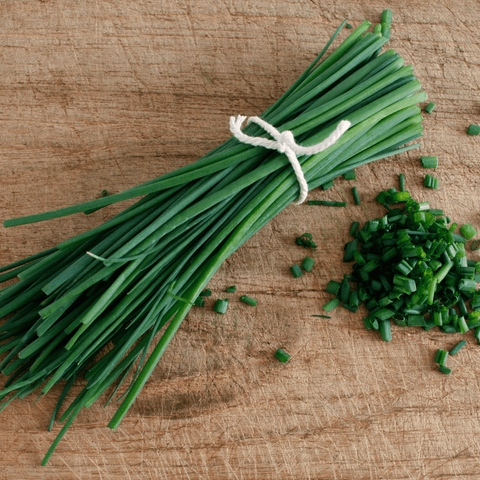

Hortinova
CHIVE - Open Pollinated Chives Seeds
Allium schoenoprasum
- Commonly known as onion chives.
- Medium thick shafted chive variety.
- Grows in clumps of small slender bulbs.
- Produces thin, tubular, blue-green leaves reaching 20 cm.
- Ideal for cultivation in pots and the preparation of dry herbs.
For a head start in colder regions, start chive seeds indoors 6 to 8 weeks before the last spring frost. Outdoors, sow seeds as soon as the soil is workable in the spring. They can take a few weeks to germinate. For the best germination and growth, the temperature of the soil should be between 60º and 70ºF (15º and 21ºC). Sow seeds about 2 inches apart and no more than ¼ inch deep. Cover with a thin layer of soil. Once seedlings emerge, thin so that plants are spaced between 4 to 6 inches apart in all directions.
PLANT OUT: Transplants need good growth before being set in the garden. transplants outdoors once the threat of frost has passed.
TEMPERATURE: Chives are considered a cool-season crop, meaning they grow best in the spring and fall. The harsher temperatures of summer usually cause them to go dormant until cool weather arrives again.
WATER: Although chives are drought tolerant, it’s important to give them consistent watering throughout the growing season for high yields. Moisten the soil thoroughly when watering.
FEED: For good production, top-dress with a nitrogen-heavy fertilizer in late spring or early summer if your soil is not already nutrient-rich.
PROTECT: Chives’ small bulbs grow near the soil surface, so use mulch to conserve moisture and keep the weeds down.
Begin harvesting chive leaves about 30 days after you transplant or 60 days after seeding. Be sure to cut the leaves down to the base when harvesting (within 1 to 2 inches of the soil). Harvest 3 to 4 times during the first year. In subsequent years, cut plants back monthly. The chive plant will flower in late spring or early summer. The flowers are edible and taste best just after they have opened—they should look full and bright.
Let customers speak for us
from 23 reviewsWe grow several varieties of various colours of tomatoes, and the contrast of these tomatoes with other colours is fantastic. We've had a very long season with our plants, excellent disease resistance, great flavour.

This review applies to all of the seeds I purchased from Hortinova - beautiful tomatoes, good disease resistance and excellent production. Our field season extended to 10 weeks. We've had comments of excellent flavour from our customers as well, highly recommend any Hortinova seed.

This tomato is good taste tomato. Small red round tomato. Bigger then cherry tomatoes but smaller then regular one. I like it. Perfect for salads and fresh eating. Ordered seeds for next season.

2nd time ordering. Very satisfied with qualify and result. Thank you

BALCONY YELLOW F1 - Hybrid Cherry Tomato Seeds

Delivered very fast, packed very good, in professional condition and quality. Thanks

DUETT - Open Pollinated Radish Seeds

We will see what they are like this summer.

Type crimson de bonne grosseur avec une superbe uniformité et très hâtif. Un des premiers prêt en saison. Semences très petites et peu nombreuses. Goût très sucré et chaire croquante. Chair passant du rose au rouge en cours de saison. Les plants sont forts et très vigoureux avec des grosses feuilles.

Vigueur des plants impressionante avec des fruits résistants aux fissures et aux dommages. Très bonne conservartion et goût très sucré lorsque les nervures deviennent orange. Peu être récolté lorsque les nervures sont vertes également. Cavité des semences très compacte et petite laissant beaucoup de chair.

Melon qui fond en boûche avec un goût se rapprochant du melon miel et du cantaloup à la fois, très sucré. Faire attention aux irriguations lorsque le melon devient mature car il peut fendre au champs. Très odorant.

Avec son apparence côtellée, son très gros calibre et ça couleur rose, cette tomate se démarque des autres sur les tablettes. Variété plus résistante à la pourriture apicale que la plus part des autres tomates roses. Bon ensemble de résitance aux maladies également.

Tomate noire dont les faces qui ne sont pas exposé au soleil passent du vert au rouge lorsque mature donnant un aspect unique aux fruits. Charactéristiques similaires à la Barrio avec un goût superbe sans acide. Les clients l'on adoré.

Superbe adaptabilité et excellente résistance aux maladies. Fruits uniformes qui ne fendent pas, bonne conservation. Ajoutez à cela un goût unique avec une légère acidité et une pointe sucré.















